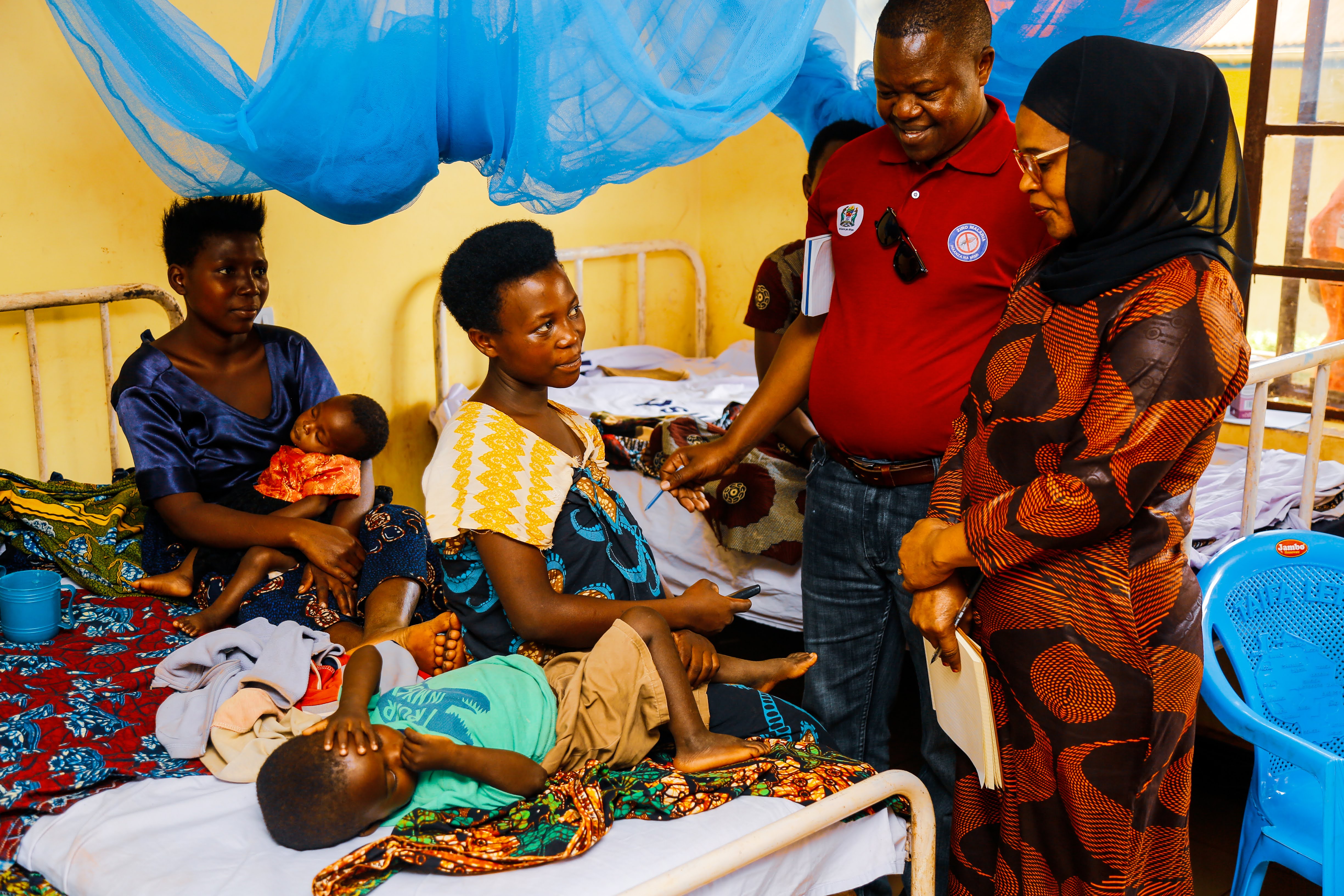
TOUR: USAID, NMCP visit Shinda Malaria project in Kagera

On August 4, the Shinda Malaria team wrapped a four-day visit it hosted in Kagera, which included representatives from the US President’s Malaria Initiative (PMI) Tanzania Mission, Ministry of Health (MoH) and members of the regional and district council health management teams (R/CHMTs). The delegation witnessed firsthand the impact of the initiatives supported by the US government in eliminating malaria in the region.
Two distinguished individuals in the field of public health, Dr. Chonge Kitojo, a seasoned development and public health professional, spearheading the USAID efforts in Tanzania; and Dr. Abdallah Lusasi, Malaria Case Management and Malaria in Pregnancy (MCM & Mip) lead serving in the MoH through the Malaria control program (NMCP) were also present during the visits.
Upon arrival in Kagera, the delegation was warmly received by Dr. Dunstan Bishanga, Chief of Party for the Shinda Malaria initiative, who gracefully introduced them to the local officials and community leaders. These leaders were enthusiastic about sharing their inspiring stories of resilience and progress in the ongoing battle against malaria.
The delegation began their visit with a courtesy call to Dr. Issasenda Kaniki, the Regional Medical Officer of Kagera. During the meeting, Dr. Kaniki provided a concise overview of the malaria situation in Kagera and discussed the collaborative efforts undertaken by his office and other stakeholders in their mission to eliminate the disease.
In his remarks, Dr. Kaniki expressed his heartfelt gratitude to the American people for their generous support through USAID and PMI. He also extended appreciation to the MoH and the President's Office – Regional Administration, and Local Government (PO-RALG) for allowing the interventions implemented by Shinda Malaria to take place in Kagera.
Monitoring antimalarial drug efficacy in Kagera
On day two of the visit, the delegation visited Nkwenda Health Center which is actively involved in antimalarial drug efficacy studies. Kagera is one of the regions in East Africa where resistance to the drug “Artemisinin” has been detected.
Dr. Kitojo was particularly interested in understanding the procedures used by the study team in drug resistance monitoring. The researchers shared their findings and expressed their gratitude for USAID's support, which had been instrumental in advancing their work.
Next, the delegation paid a visit to Rukuraijo Dispensary, where they met Datius Rukola, a tireless healthcare worker whose commitment to her community was evident in his every action. He guided the delegation through the clinic, displaying the diagnostic facilities, treatment centers, and the distribution of mosquito nets made possible by the funding from USAID.
The clinic staff and Mr. Rukola commended the collaboration between the local health authorities and the international donors in implementing the program. The community's proactive engagement and education initiatives had helped raise awareness about malaria prevention and treatment, leading to a substantial decline in cases.
Faith-based approach to eliminate malaria in Kagera
Dr. Kitojo expressed his deep admiration for the remarkable efficiency and unwavering dedication of Fr. George Pulula from Rukuraijo Parish, one of the few religious leaders chosen by the Shinda Malaria project to play a crucial role in educating the community about malaria.
The project had successfully engaged religious leaders and traditional healers in Kagera, empowering them to act as agents of change. Through their gatherings and interactions, these influential figures now serve as vital educators, spreading essential knowledge about malaria and its prevention.
Local partnership in the fight against malaria
Afterwards, the delegation made their way to Omkakajinja, a remote village situated on the outskirt of Karagwe district council profoundly impacted by malaria. During their visit, they had the opportunity to meet Juita Josia (23), a pregnant mother and a courageous survivor of malaria.
Ms. Josia shared her harrowing journey with the disease and expressed deep appreciation for the assistance she received from a Community Health Worker (CHW) enlisted by the project. The mentioned worker provided crucial education about malaria, which proved to be invaluable in her recovery process.
About Shinda Malaria
The President’s Malaria Initiative | Tanzania Malaria Surveillance Activity (PMI | TMSA) is a five-year program (August 2022 – August 2027) implemented by Ifakara Health Institute, which supports the Government of Tanzania (GOT) in reducing the malaria burden and in moving toward the long-term goal of malaria elimination. The Activity is made possible by the support of the American people through the US President’s Malaria Initiative (PMI) and the United States Agency for International Development (USAID).
